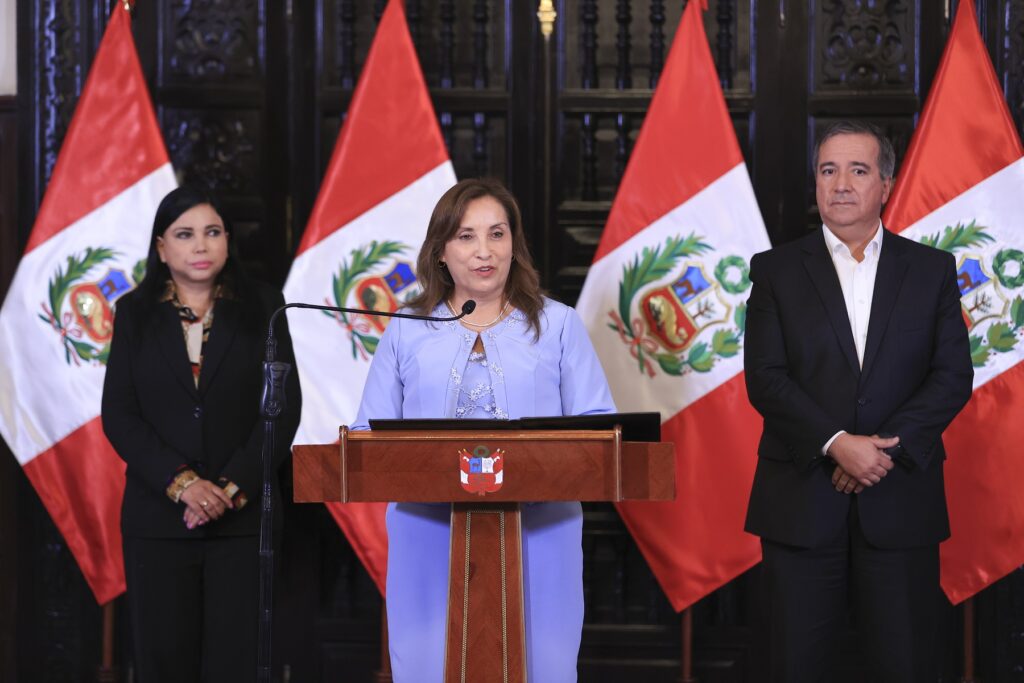Agencia Peruana de Noticias PRENSAPERU.PE https://prensaperu.pe/ Twitter: @prensaperupe La presidenta de la república, Dina Boluarte Zegarra, promulgó dos leyes que promoverán el desarrollo, la modernización y la competitividad del sector portuario. Estas normas producirán un impacto positivo en la reactivación y fortalecimiento de la economía.
“Hoy es un día histórico para nuestro país. Con la promulgación de la modificación de la Ley del Sistema Portuario Nacional y la Nueva Ley de Cabotaje, estamos marcando un antes y un después en el camino hacia la competitividad, la conectividad y el desarrollo de nuestra querida patria”, manifestó la mandataria, en Palacio de Gobierno.
Los cambios realizados a Ley del Sistema Portuario Nacional permiten que el titular de un puerto privado de uso público, que posea habilitación portuaria, pueda brindar servicios portuarios de manera exclusiva, previa aprobación de la Autoridad Portuaria Nacional.
Asimismo, la norma brinda la posibilidad de que los contratos de concesión suscritos para la administración de infraestructura portuaria puedan ser prorrogados hasta por 30 años adicionales. Para ello, se tomará en cuenta la evaluación de los concesionarios bajo criterios técnicos.
“Un ejemplo del impacto positivo lo veremos en el Megapuerto de Chancay, concesionado a Cosco Shipping, que entrará en operación en noviembre de este año. Este proyecto generará un beneficio económico y social equivalente a 4 mil 500 millones de dólares al año, es decir, 1.8% del PBI país. Además, creará 8 mil 550 empleos directos, dinamizando la pesca, la agroindustria, la manufactura y el comercio”, dijo la jefa de Estado.
LEY DE CABOTAJE
La nueva Ley de Cabotaje, favorecerá la captación de mayores volúmenes de carga al fomentar una mayor interacción entre todos los puertos del país, a través de la vía marítima. Este era un pedido de los empresarios, sobre todo de los dedicados a la exportación. Se entiende por cabotaje toda operación de transporte de carga o de pasajeros, de origen nacional para destino nacional, que se realiza a través de los puertos de la república.
“En adelante, el transporte marítimo de carga entre puertos peruanos será realizado por embarcaciones nacionales o extranjeras, impulsando el desarrollo de nuestros puertos, y nuestro comercio nacional e internacional”, afirmó la presidenta.
La jefa de Estado agradeció a los legisladores por la aprobación de estas dos leyes. “Los insto a seguir trabajando en esta ruta, por un Perú más justo, próspero y con mayores oportunidades para todas y todos”, indicó la mandataria, durante la ceremonia de promulgación de la norma, en la que estuvieron presentes los ministros de Transportes y Comunicaciones, Raúl Pérez-Reyes, y de Comercio Exterior y Turismo, Elizabeth Galdo.
También asistieron el presidente de la Comisión de Transporte del Congreso, Eduardo Salhuana; el presidente del directorio de la Autoridad Portuaria Nacional, Juan Carlos Paz, y representantes de diversos gremios del sector privado, entre otros.
Fuente: Agencia Peruana de Noticias PRENSAPERU.PE https://prensaperu.pe/ Twitter: @prensaperupe

English Translation
Government enacts laws that will promote the development and competitiveness of the port sector with powers for the National Port Authority.
Peruvian News Agency PRENSAPERU.PE https://prensaperu.pe/ Twitter: @prensaperupe The president of the republic, Dina Boluarte Zegarra, promulgated two laws that will promote the development, modernization and competitiveness of the port sector. These regulations will have a positive impact on the reactivation and strengthening of the economy.
“Today is a historic day for our country. With the promulgation of the modification of the National Port System Law and the New Cabotage Law, we are marking a before and after on the path towards competitiveness, connectivity and development of our beloved homeland,” said the president, in Government palace.
The changes made to the National Port System Law allow the owner of a private port for public use, which has a port authorization, to provide port services exclusively, with prior approval from the National Port Authority.
Likewise, the rule provides the possibility that concession contracts signed for the administration of port infrastructure can be extended for up to 30 additional years. To do this, the evaluation of the concessionaires under technical criteria will be taken into account.
“We will see an example of the positive impact in the Chancay Megaport, concessioned to Cosco Shipping, which will enter into operation in November of this year. This project will generate an economic and social benefit equivalent to 4.5 billion dollars per year, that is, 1.8% of the country’s GDP. In addition, it will create 8,550 direct jobs, boosting fishing, agribusiness, manufacturing and commerce,” said the head of state.
CABOTAGE LAW
The new Cabotage Law will favor the capture of greater volumes of cargo by promoting greater interaction between all the country’s ports, through the sea route. This was a request from businessmen, especially those dedicated to export. Cabotage is understood as any cargo or passenger transportation operation, from national origin to national destination, that is carried out through the ports of the republic.
“From now on, maritime cargo transportation between Peruvian ports will be carried out by national or foreign vessels, promoting the development of our ports, and our national and international trade,” stated the president.
The head of state thanked the legislators for the approval of these two laws. “I urge you to continue working on this route, for a fairer, more prosperous Peru with greater opportunities for everyone,” said the president, during the ceremony for the promulgation of the norm, in which the ministers of Transportation and Communications, Raúl Pérez-Reyes, and Foreign Trade and Tourism, Elizabeth Galdo.
Also attending were the president of the Congressional Transportation Commission, Eduardo Salhuana; the president of the board of directors of the National Port Authority, Juan Carlos Paz, and representatives of various private sector associations, among others.
Source: Peruvian News Agency PRENSAPERU.PE https://prensaperu.pe/ Twitter: @prensaperupe
